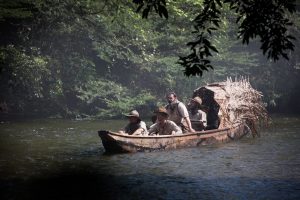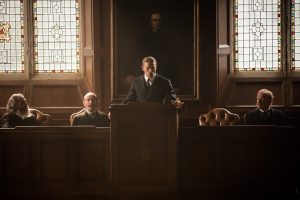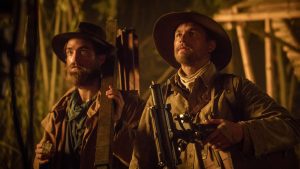![]()
For many of us, it’s astounding that only a century ago there were large parts of the world unmapped and unexplored. Perhaps that made it easier to believe some of the mysterious legends that could have lured adventure seekers and those desperate to make their mark in history. The Lost City of Z is a biopic of Percival Fawcett, a British army officer who devoted his life to locating a fabled site of an indigenous people in the Amazonian jungle.
 Beginning in 1905, the film depicts Percival (Charlie Hunnam) as a Major, frustrated with his lack of upward mobility within his career, which has been thwarted by his “unfortunate choice of ancestors.” Namely his father, noted to be disgraced within his field by alcoholism. However, Percival receives a break when he is given a lengthy assignment as a surveyor along the disputed border of Bolivia and Brazil. Along the way he meets and befriends Corporal Henry Costin (Robin Pattinson) and learns about a lost civilization with golden structures. The tale is met with scorn and skepticism back in England. However, it only motivates the explorer to spend the next 20 years searching for the lost city in order to prove them all wrong.
Beginning in 1905, the film depicts Percival (Charlie Hunnam) as a Major, frustrated with his lack of upward mobility within his career, which has been thwarted by his “unfortunate choice of ancestors.” Namely his father, noted to be disgraced within his field by alcoholism. However, Percival receives a break when he is given a lengthy assignment as a surveyor along the disputed border of Bolivia and Brazil. Along the way he meets and befriends Corporal Henry Costin (Robin Pattinson) and learns about a lost civilization with golden structures. The tale is met with scorn and skepticism back in England. However, it only motivates the explorer to spend the next 20 years searching for the lost city in order to prove them all wrong.
 The film does a good job of making its lead compelling, despite his obsession. While this is a very flawed character, his personality traits aren’t overplayed. One gets a clear sense of exactly why he’s so motivated, and it isn’t by greed. This is a strong-willed personality desperate to make a name for himself and disprove the outdated, inaccurate beliefs of his contemporaries. His multiple follow-up trips are filled with peril, but one can see how others might follow his questionable lead. The movie chooses not to judge, only to present the character’s determination and open-mindedness alongside his flaws. Understandably, wife Nina (Sienna Miller) and family members like son Jack (Tom Holland) vocalize feelings of abandonment and anger.
The film does a good job of making its lead compelling, despite his obsession. While this is a very flawed character, his personality traits aren’t overplayed. One gets a clear sense of exactly why he’s so motivated, and it isn’t by greed. This is a strong-willed personality desperate to make a name for himself and disprove the outdated, inaccurate beliefs of his contemporaries. His multiple follow-up trips are filled with peril, but one can see how others might follow his questionable lead. The movie chooses not to judge, only to present the character’s determination and open-mindedness alongside his flaws. Understandably, wife Nina (Sienna Miller) and family members like son Jack (Tom Holland) vocalize feelings of abandonment and anger.
Another plus is the impressive cinematography from Darius Khondji (Seven, Panic Room, Midnight in Paris). It’s a lovely-looking film with soft colors throughout, but the photography never presents the Amazonian jungle as a lush and tropical paradise. The appearance maintains a gritty, dirty quality that helps highlight the inherent threat of such a journey. Over the course of the expeditions, the travelers must contend with raging waters, wild animals, sicknesses and the various native tribes (some of whom are hostile). Much of it looks striking and there are plenty of memorable images.
 This is a long film, and because of its downbeat nature, it may eventually tire viewers out. True stories are inherently difficult to adapt, and here when the lead character makes many trips back and forth between civilization and the jungle. This does lead to a pacing lull here and there. A few characters, like Bolivian slave trader Baron De Gondoriz (Franco Nero) are introduced and then only referenced again in passing, which does make one wonder if their presence was necessary in the first place. And in effort to strike an epic tone, a final claim made by the lead feels like something of a rationalization. Then again, his decisions and strange motivations about one’s legacy are ultimately for the viewer to consider after.
This is a long film, and because of its downbeat nature, it may eventually tire viewers out. True stories are inherently difficult to adapt, and here when the lead character makes many trips back and forth between civilization and the jungle. This does lead to a pacing lull here and there. A few characters, like Bolivian slave trader Baron De Gondoriz (Franco Nero) are introduced and then only referenced again in passing, which does make one wonder if their presence was necessary in the first place. And in effort to strike an epic tone, a final claim made by the lead feels like something of a rationalization. Then again, his decisions and strange motivations about one’s legacy are ultimately for the viewer to consider after.
Remarkably, as faulty and ill-fated as some of Fawcett’s decisions may have been, his persistence did result in some discoveries, and caused many to reevaluate their backward views of the world and its ancient cultures. Additionally, I was engaged over the lengthy running time, which is certainly a compliment to the overall production. The Lost City of Z isn’t always a pleasant stroll into the wild, but it is a fascinating portrait of a unique and determined individual.


